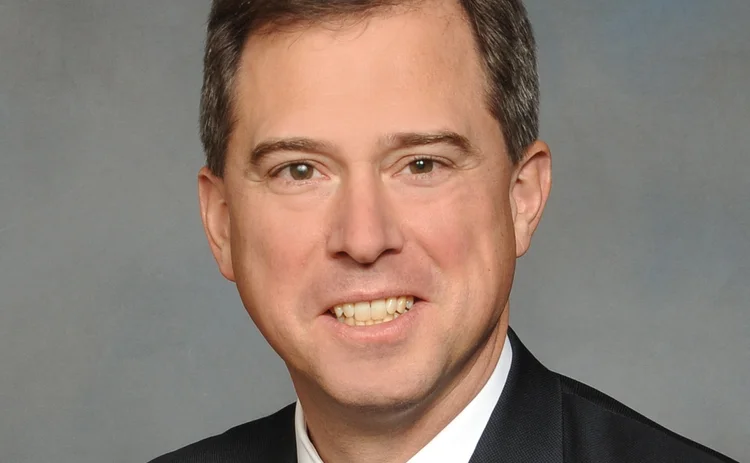Inside Market Data Hall of Fame: Tom Davin - 'The Mediator'
FISD head Tom Davin becomes the 30th inductee into the Inside Market Data Hall of Fame

But Davin was born to mediate, being "a rare native" of Washington, DC, having lived and flourished in the seat of US politics since birth. After leaving Georgetown University with a degree in economics, he dove straight into the market data pool at Nasdaq, in the department that was then the NASD (National Association of Securities Dealers). His first job was in the call center, sorting out issues for people taking the Series 7 securities exam─a far cry from his college job managing a pizzeria.
When a promotion opportunity arose on the Nasdaq side of the business, Davin jumped at it, launching a nearly 30-year market data career. "Nasdaq looked a little sexier than the NASD. It was the ‘cool' and ‘dynamic' side," he says.
Davin immediately saw that market data was an important business for the exchange. Yet, while the glitzier trading and listings departments at Nasdaq got all the attention, market data was a bit of a "backwater," Davin says.
This gave him the opportunity to manage a whole business line that had a disproportionate influence in the exchange. In just a few years Tom grew the department's revenues nearly six-fold. As a result, he got exposure to senior management more quickly. "They used to call me the 40 million dollar man in 1989," he recalls. Before he left for FISD in 2004, Nasdaq's data revenues were hovering in the $230 million range.
In 1999, in the midst of growing the business, Nasdaq underwent a major sea change as it de-mutualized, going from not-for-profit status to a public company. It was to be Davin's greatest challenge at Nasdaq. "Suddenly we were publicly traded and we had shareholders. We began to fully realize the value of what we had been producing," he says.
Nasdaq's proprietary data, as opposed to what was shared in the US consolidated tape plans, was a new money-spinner. New proprietary products created under Davin's direction added almost $13 million to Nasdaq's top line in just three years. However, Davin also had to deal with the newly formed UTP (Unlisted Trading Privileges) plan, which was taking over the centralized processing of securities, and separating out Nasdaq's SIP [securities information processor]. "I went from one boss to eight bosses, most of whom were also competitors," he says.
Here, no doubt, Davin honed the diplomacy skills he would require as head of FISD.
After nearly three decades at Nasdaq, Davin slid into the FISD role a month after long-time director Mike Atkin left in October 2004. Davin was no stranger to FISD, having represented Nasdaq for 12 years and been chairman of the Executive Committee for a year and half.
He was in the not-for-profit world again, this time in a neutral forum which provided a safe space for members to argue or disagree. "At the exchange I was well aware of the conflicts [in the market data world], and was even a party to some of them," he says, though his first task was to undertake a "listening tour" with members. "I did not want to assume that what Nasdaq liked was what everyone liked," he adds.
Still, the shift from Nasdaq to FISD was something of a shock; he went from having 1,500 colleagues at Nasdaq to 50 at SIIA, and from managing products and selling them to managing forums and events. "At FISD the only product was its events, and I had almost no experience."
He learned fast. Events have become FISD's forte under Davin leadership. From holding perhaps half a dozen events only in the US and London, he increased their frequency, venturing into Europe, Asia, Canada and South America. A Hong Kong event, held with Inside Market Data parent Incisive Media, became the lynchpin for events in seven more regional countries. FISD has also added women's programs, technology and index forums. In fact, the forums are still FISD's raison d'etre. "Working groups are as─if not more─important than events. They are where we sit down and hash out problems," he says.
His biggest challenge at FISD came during the merger-and-acquisition frenzy of the mid-2000s, when mergers including Thomson and Reuters and CME, CBOT and Nybot created larger member bodies that, ironically, paid lower dues. "Our prices are based on a volume discount," Davin says . "Combined revenues for the new groups were less than the original members contributed."
Davin's response was to grow the membership, and in the 10 years since joining FISD, has taken revenues from membership dues from $800,000 to more than $2 million. But the market data industry has changed dramatically over the same period, and "market data executives are no longer just procurement guys," requiring a range of different skillsets, which FISD has begun supporting, training and certifying with its Financial Information Associate certification program. In fact, the program has proved so successful that FISD plans to introduce intermediate certification levels in specific sub-areas relating to data.
His FISD colleague Nick Merritt, says Davin's exchange background gives him perspective and a "rare ability to see both the ‘big picture' as well as the details in the issues that impact our industry." Merritt also says Davin can grasp issues from other participants, be they exchanges, vendors, or end users of data. "His tireless work ethic and talent for building consensus have enhanced effectiveness and efficiencies for so many in our field," Merritt says.
Only users who have a paid subscription or are part of a corporate subscription are able to print or copy content.
To access these options, along with all other subscription benefits, please contact info@waterstechnology.com or view our subscription options here: https://subscriptions.waterstechnology.com/subscribe
You are currently unable to print this content. Please contact info@waterstechnology.com to find out more.
You are currently unable to copy this content. Please contact info@waterstechnology.com to find out more.
Copyright Infopro Digital Limited. All rights reserved.
As outlined in our terms and conditions, https://www.infopro-digital.com/terms-and-conditions/subscriptions/ (point 2.4), printing is limited to a single copy.
If you would like to purchase additional rights please email info@waterstechnology.com
Copyright Infopro Digital Limited. All rights reserved.
You may share this content using our article tools. As outlined in our terms and conditions, https://www.infopro-digital.com/terms-and-conditions/subscriptions/ (clause 2.4), an Authorised User may only make one copy of the materials for their own personal use. You must also comply with the restrictions in clause 2.5.
If you would like to purchase additional rights please email info@waterstechnology.com
More on Awards & Rankings
Waters Rankings 2025: Best execution management system (EMS) provider—SS&C Advent
Name of product or service: RealTick (Eze EMS)
Waters Rankings 2025: Best accounting system provider—SS&C Advent
Name of product or service: SS&C Geneva and Advent Portfolio Exchange (APX)
Waters Rankings 2025: Best distributed-ledger technology provider—DTCC
Name of product or service: DTCC ComposerX suite of products
Sell-Side Technology Awards 2025 winner’s interview—FIS
FIS’s Post Trade Processing platform brings success in the Sell-Side Technology Awards
Waters Rankings 2025 winner’s interview—S&P Global Market Intelligence
S&P Global Market Intelligence's Justine Iverson discusses the firm's wins in the 2025 Waters Rankings, alongside the versatility its S&P Capital IQ Pro offering platform.
Waters Rankings 2025: Best outsourcing service provider—SmartStream Technologies
Name of product or service: SmartStream’s managed services
Waters Rankings 2025: Best buy-side order management system (OMS) provider—Bloomberg
Name of product or service: Bloomberg AIM
Waters Rankings 2025: Best artificial intelligence (AI) technology provider—S&P Global Market Intelligence
Name of product or service: S&P Capital IQ Solutions AI-Powered features



